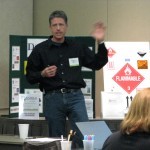The Bullet:
The deliberate falsification of HazMat shipping papers by a company official led to conviction and sentencing in a criminal court.

Who:
The Defendant is Mr. Ryan Thomas, former Logistics Manager for CES Environmental Services in Houston, Texas.
The case was investigated by EPA’s Criminal Investigation Division and the U.S. Department of Transportation, the Texas Commission on Environmental Quality, the Houston Police Department, the U.S. Department of Labor and the U.S. Coast Guard. It was prosecuted by the Department of Transportation with assistance of Department of Justice’s Environmental Crimes Section.
What:
Mr. Thomas was sentenced to 12 months’ probation, ordered to pay a $500 fine, and to serve 100 hours of community service.
Where:
The CES Environmental Services facilities in question are located in Houston and Port Arthur, TX.
Mr. Thomas was sentenced in U.S. District Court in Beaumont, Texas.
When:
Mr. Thomas was sentenced on July 14, 2014.
Why:
Mr. Thomas produced manifests that falsely indicated that three cargo tank motor vehicles of wastewater originated from the CES Houston plant when in fact, they were produced and shipped from the CES Port Arthur (PACES) plant. The PACES location had been placed on a moratorium after a November 3, 2008, accident in which a CES driver was overcome by vapors released during the offloading of wastewater. The disposal facility placed the moratorium on all loads of waste-water from the PACES location until the cause of the accident could be identified and new inbound load testing protocols were agreed to. Mr. Thomas’ actions sought to circumvent this moratorium.
How:

The deliberate falsification of HazMat shipping papers caused this case to be treated as a criminal case and not a civil. The USEPA has the authority to turn cases such as these over to the Department of Justice who then prosecutes criminal cases on their behalf.
Conclusion:
Usually, violations of Agency regulations result in civil penalties and forfeitures. In situations where deliberate falsification is suspected – such as this one – criminal prosecution may result. Whether civil or criminal, no person or company wants to subject itself to the problems that non-compliance can bring. Make certain that your facility is in compliance with the regulations of the USEPA, your state, and the USDOT for the cradle-to-grave management of hazardous waste and the transportation of hazardous materials. I can assist you with compliance in several ways:
Contact me with any questions you may have about the transportation of hazardous materials Daniels Training Services 815.821.1550 |
- Contact me with a question about the regulations or for a free training consultation.
- Subscribe to my Monthly Newsletter.
- Arrange for one of my many training options to ensure all of your personnel are familiar with the applicable regulations.
Like this article?
Subscribe to my Monthly Newsletter
No marketing emails!


